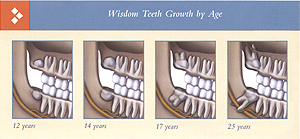Do Wisdom Teeth cause crowding of your front teeth?
Wisdom Teeth…How many times have you heard this? Did you know this all started after a paper was written on by an orthodontist over 50 years ago?
In 1961, orthodontist Dr. Leroy Vego, published an article, “A Longitudinal Study of Mandibular Arch Perimeter” which examined the role of wisdom teeth on lower front tooth crowding. This study was run over six years with patients from ages 13 to 19. He reported that there was a significantly greater degree of crowding in patients with wisdom teeth. Dr. Vego concluded: “that the erupting lower third molar can exert a force on approximating teeth.”
From this statement, it was decided that lower wisdom teeth “push” the teeth in front of them as they come into the mouth, causing the front teeth to crowd. Consequently, general dentists, orthodontists, and oral surgeons recommended the extraction of them to prevent the recurrence of crowding after orthodontic treatment.
Later research disproves Dr Vego’s theory that wisdom teeth exert enough pressure to affect the movement of anterior teeth. Later studies tracking patients for 25 years determined that aging was also a major factor whether a patient went through orthodontic treatment or not and that teeth drift forward throughout life naturally, along with other factors. Tooth-size, tooth-shape, and original tooth-position also play a significant role in crowding.
Today, the premise no longer exists for the extraction of those teeth simply to minimize future crowding of front teeth. However, timing of the removal of suspect teeth, especially impacted wisdom teeth that don’t have room to erupt properly, is still recommended no later than late teens through early 20’s. Wisdom teeth can easily cause future dental problems.
What problems can occur with NOT removing impacted/retained wisdom teeth?
- Bone and soft tissue defects behind the second molars
- Root resorption of second molars
- Decay due to inability to brush and floss properly
- Crowding or shifting of posterior teeth affecting orthodontic results
- An infection (periocornitis) that occurs around partially erupted lower third molars
- Cysts and tumors around impacted third molars
Consequently is it generally recommended those teeth be extracted before these problems develop.
At the orthodontic office of Lisa P. Howard DDS MS, we encourage the extraction of wisdom teeth, if indicated, prior to college. As teens complete final growth, jaw bones become increasingly more dense. This may result in higher post-operative pain following wisdom tooth removal, especially after the roots of the third molars are fully developed. Typically, after the age of 25, wisdom teeth are not extracted and simply monitored by your general dentist with routine periodic x-rays to address any cause for concern.
Dr. Lisa P. Hoeard DDS MS monitors third molar development throughout treatment and will make recommendations when appropriate based on individual circumstances. Feel free to contact our office in Scarborough ME or leave a comment below regarding more information about the extraction of wisdom teeth. We look forward to your questions, comments, or feedback.

